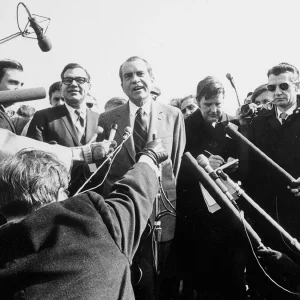
Declining social capital in the US has worsened polarization, slowed economic growth, and led to the death of local communities. The social bureaucracies that the capitalist world has created to address this problem have only exacerbated it.
In the early 1970s, the General Social Survey asked the American public if they could trust others. Over half of all respondents responded affirmatively. Today that figure is less than a third. This decline in trust is a symptom of a more widespread decay of local friendships and communities across the US, otherwise known as social capital. Let’s dive into why this sucks.
The term ‘social capital’ emerged originally as an academic term in the 70s, but can be used to refer to the amount and strength of relationships among people in a society. High social capital is the reason that neighbors feel comfortable borrowing sugar or asking each other to watch their kids for a few hours. It creates the kind of trust that enables people to leave their doors unlocked and businesses to provide services before being paid. In times of crisis—natural disasters, school shootings, pandemics—these existing relationships and institutions become vital support systems, enabling communities to respond with resilience and solidarity. For this reason, a high level of social capital corresponds directly to higher economic growth rates, better health outcomes, and more stable democracies.
Low levels of social capital on the other hand can have terrible consequences. Terrible for economics and health, but also surprisingly for polarization. As relationships in local communities wane, neighborhood participation in family and faith-based organizations naturally decreases. Many turn to politics as a substitute. Without the cultural fulfillment that family and friends provide, people begin to invest more heavily in political identities. This leads to a kind of moral polarization, where political affiliation is not just a belief system, but a source of identity, belonging, and in many cases, a sense of purpose. Because politics is being used as a replacement for faith, it may even take on a metaphysical dimension, where political adversaries are seen not as people with differing views, but as embodiments of evil. The result is the sort of hyperpartisan political acrimony that we see online today.
So we know social capital is vital, its decline has serious consequences, and it’s dropped sharply in the US, especially in the last two decades. Why is this?
Well, there are a variety of reasons, but the biggest driver of the loss of trust is the internet. The internet has almost single-handedly killed reasonable public discourse, turning it into a caustic cage fight. Humans simply did not evolve to be able to handle the amount of information—and vitriol, hate, and general unpleasantness—offered by the internet, and it is slowly turning us all into digital recluses. We go out less, and when we do, we’re less social. In 2008, 7 in 10 people said they talked to their neighbor a few times a week or more. In 2017, that number had dropped to 5 in 10. In 2023, that number is down to 2.
As if this wasn’t enough, the pandemic took this trend and accelerated it tenfold. Months of social isolation allowed us to become comfortable sitting at home by ourselves. Zoom calls replaced family gatherings, and online shopping substituted casual chats at local stores. Studies have even shown that trust is far lower during remote work, creating the need for workplace spyware like cameras and screen monitors. Now, as we attempt to return to normal, it’s clear that our definition of community has drastically changed—and not for the better.
As people trust each other less, they turn to the state to provide the social services that were once found in their communities. To substitute for local relationships that allowed self-governance, we’ve created such stifling monsters as the homeowner’s association (HOA), strangling community spirit and transforming local governance into a bureaucratic nightmare of lawn-length regulations and paint-color ultimatums. Not to involve a personal bias against HOAs, but they—like most social bureaucracies—fail.
The problem with social bureaucracies, especially ones created by the state to substitute for local communities, is that they require an insane amount of autocratic control over everyday relationships and life in general in order to achieve their goals. By trying to manage human behavior in a one-size-fits-all manner, they fail not only to account for the unique needs of individuals but also end up alienating people and stifling the sense of personal agency that local governance naturally encourages.
Social bureaucracies are fundamentally unable to create genuine social capital. If anything, they contribute to the further erosion of trust, because they’re concerned with enforcement, not engagement. It certainly doesn’t help that their stated goals are almost always unimpeachable—safety, harmony, and so on in the case of HOAs—but that’s only because they try to artificially achieve something that local communities have been achieving autonomously for hundreds of years.
The solution to our problems—sluggish economic growth, worse public health, lower upward social mobility—will not be found in the very institutions by whose failure these problems have emerged in the first place. Nor will the solution be found in dialogue, compromise, or in watching both Fox and CNN. No, the first step is a return to communitarianism, a re-adoption of local communities. It is a kind of heroism that is quieter and humbler than that of our grandparents.
In short, start a community garden. You might save the world.
Featured Image Source: Vox
#socialcapital #society #community #bureaucracy #trust #communitarianism





Comments are closed.